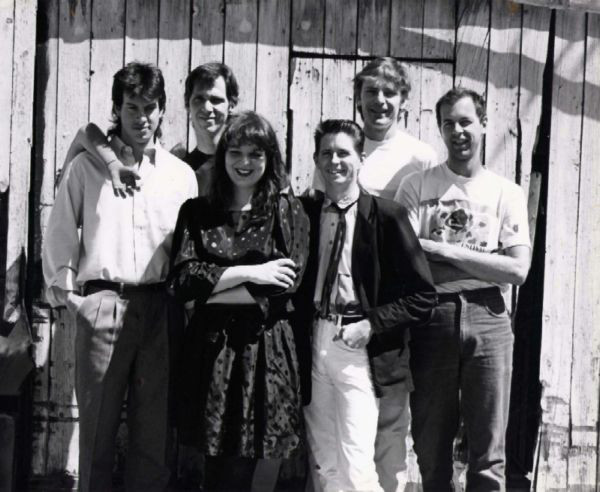
Exposé Online
What's old
Exposé print issues (1993-2011)
- 1 (October 1993)
- 2 (February 1994)
- 3 (May 1994)
- 4 (August 1994)
- 5 (October 1994)
- 6 (March 1995)
- 7 (July 1995)
- 8 (November 1995)
- 9 (March 1996)
- 10 (August 1996)
- 11 (February 1997)
- 12 (May 1997)
- 13 (October 1997)
- 14 (February 1998)
- 15 (July 1998)
- 16 (January 1999)
- 17 (April 1999)
- 18 (November 1999)
- 19 (May 2000)
- 20 (October 2000)
- 21 (March 2001)
- 22 (July 2001)
- 23 (December 2001)
- 24 (April 2002)
- 25 (September 2002)
- 26 (February 2003)
- 27 (August 2003)
- 28 (December 2003)
- 29 (April 2004)
- 30 (September 2004)
- 31 (March 2005)
- 32 (September 2005)
- 33 (May 2006)
- 34 (March 2007)
- 35 (January 2008)
- 36 (October 2008)
- 37 (July 2009)
- 38 (July 2010)
- 39 (Summer 2011)
Features
Music for a Crisis of Survival —
A Profile of Mike Johnson and Thinking Plague 1998
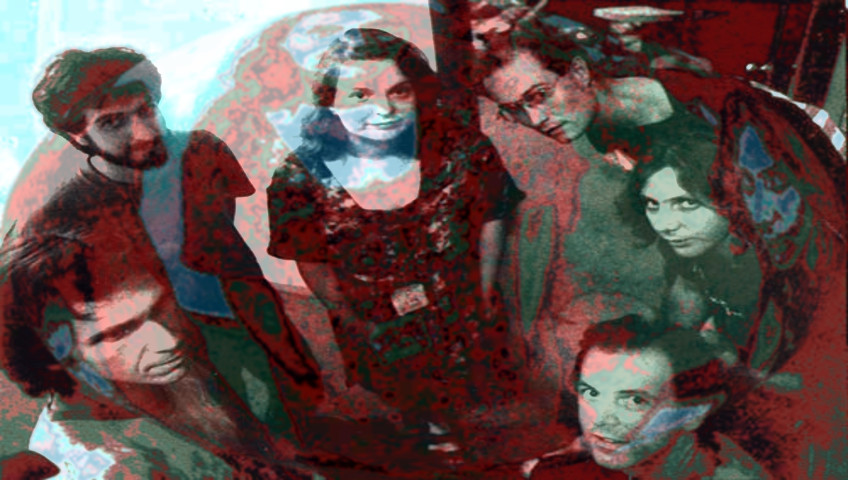
While speaking with Mike Johnson, co-founder, guitarist, and principal composer of Denver’s Thinking Plague, it was clear to me that this man knows exactly what he’s doing. Confident but never condescending, amiable but with a sizeable chip on his shoulder, Mike Johnson is proud of what he has accomplished as both a composer and as a guitarist. But he holds no delusions that he will ever make a decent living playing music.
by Steve Robey, Published 1999-04-01
Music as complex, modern, and harmonically challenging as that of Thinking Plague will just never have a very wide audience base, even though the few that get a chance to hear it are often deeply affected by it, as I was. Johnson feels that popular music has reached an all-time low in terms of expanding horizons. One can see his point. Gone are the here-goes-nothing 60s, the prog 70s, and even the relatively wide selection of pop in the 80s. Johnson feels the media is mostly to blame for this. We get told what to like and what not to like, and we’re spoon-fed a steady diet of what they want us to like. Most of us just don’t get to hear anything else unless we get really far-out (and read Exposé, kids!) and look for the obscure. The internet has made it possible for people to find out about obscure artists like Thinking Plague, even though the radio stations would rather we grooved to the new Sugar Ray single. Rather than digest disposable four-minute MTV jingles, we can experience the vast, complex soundscapes of Thinking Plague, and hear its passages again and again, like a favorite passage from a good book.
Johnson doesn’t set out to write “complex,” “dissonant,” or “RIO” music, he just writes what feels right to him. He sees rhythm, melody, and harmony differently from many of us. He writes what is in his head, and if it’s dissonant or it’s harmonious, then so be it, as long as it is right for the development of the piece. Many will draw comparisons to Henry Cow, Frank Zappa, Samla Mammas Manna, and even 5uu’s, but Johnson insists that he does not consciously follow any general path of musical styles. In reality, tags like “RIO” and “symphonic prog” are classifications invented by fans for the convenience of the fans. Despite Thinking Plague’s reputation as an RIO band, Johnson does not feel that he is necessarily a part of this “movement.”
“To us, the creators of this music, it does not sound so similar and unified,” Johnson explains.
 Certainly a close listen to Thinking Plague’s latest release, In Extremis, released this past summer on the Cuneiform label (see roundtable review in this issue), will reveal it to be worlds away from supposedly similar outfits such as 5uu’s. Personnel-wise they are certainly similar, which may tempt casual listeners to project this perceived musical kinship. 5uu’s leader David Kerman is currently Thinking Plague’s drummer, and 5uu’s bassist / vocalist Bob Drake was a founding member of Thinking Plague back in 1982, and still does much of the engineering as well as some bass, violin, and vocals. Mike Johnson himself often tours with 5uu’s as their guitarist. Still, the similarity stops there. While 5uu’s features Kerman’s compositions, Thinking Plague is the domain of Mike Johnson’s compositions. They are both accomplished writers with a great deal of depth to their compositions, within which there is a seemingly limitless capacity for originality. Johnson feels that Thinking Plague is “less in pursuit of the cutting edge” than 5uu’s are (he feels that 5uu’s are the leading proponents of what people call RIO today); Thinking Plague’s music has more grounding in melodicism and song-oriented forms, even though at first this is hard to detect. The melodies are obtuse and the songs shift constantly into new and different sections, especially on In Extremis. Still, the melodies and the song forms are there to enjoy, making Thinking Plague a lot more accessible than one might imagine.
Certainly a close listen to Thinking Plague’s latest release, In Extremis, released this past summer on the Cuneiform label (see roundtable review in this issue), will reveal it to be worlds away from supposedly similar outfits such as 5uu’s. Personnel-wise they are certainly similar, which may tempt casual listeners to project this perceived musical kinship. 5uu’s leader David Kerman is currently Thinking Plague’s drummer, and 5uu’s bassist / vocalist Bob Drake was a founding member of Thinking Plague back in 1982, and still does much of the engineering as well as some bass, violin, and vocals. Mike Johnson himself often tours with 5uu’s as their guitarist. Still, the similarity stops there. While 5uu’s features Kerman’s compositions, Thinking Plague is the domain of Mike Johnson’s compositions. They are both accomplished writers with a great deal of depth to their compositions, within which there is a seemingly limitless capacity for originality. Johnson feels that Thinking Plague is “less in pursuit of the cutting edge” than 5uu’s are (he feels that 5uu’s are the leading proponents of what people call RIO today); Thinking Plague’s music has more grounding in melodicism and song-oriented forms, even though at first this is hard to detect. The melodies are obtuse and the songs shift constantly into new and different sections, especially on In Extremis. Still, the melodies and the song forms are there to enjoy, making Thinking Plague a lot more accessible than one might imagine.
ProgDay 1999
Thinking Plague will appear at the fifth annual Prog Day in summer 1999 in Chapel Hill, North Carolina. They may preface the performance with some warm-up gigs, but for the most part, a Thinking Plague live performance is a rare event indeed. Mike Johnson and his current lineup of musicians now face the formidable task of adapting the dense, difficult material to stage performance. Although at the time of the interview, Johnson had not completed any rearrangement of his pieces for performance, he hints that he may go for the “Gentle Giant approach” – re-scoring and combining previously unrelated pieces into new suites.
The re-scoring is inevitable, as certain passages of In Extremis feature string sections, multiple horns, and vocal choruses. Thinking Plague will likely employ two keyboards to help flesh out the sound, and new (as of the In Extremis album) vocalist Deborah Perry will supervise the vocal harmonies. Another newcomer, Dave Willey (the bass player on the album) is proficient in a number of instruments, and it is likely he too will be wearing many hats. Reed player extrordinaire Mark Harris (who has been with the band since their last album way back in 1989) will be there, and you can be sure he will be all over the place. David Kerman will possibly have some hand in the rearrangements, as he and Johnson have worked together in 5uu’s to great effect. Founding member Bob Drake, whose production and occasional bass and vocal duties comprise some of In Extremis’s highlights, will sadly not be present.
A Little Philosophy
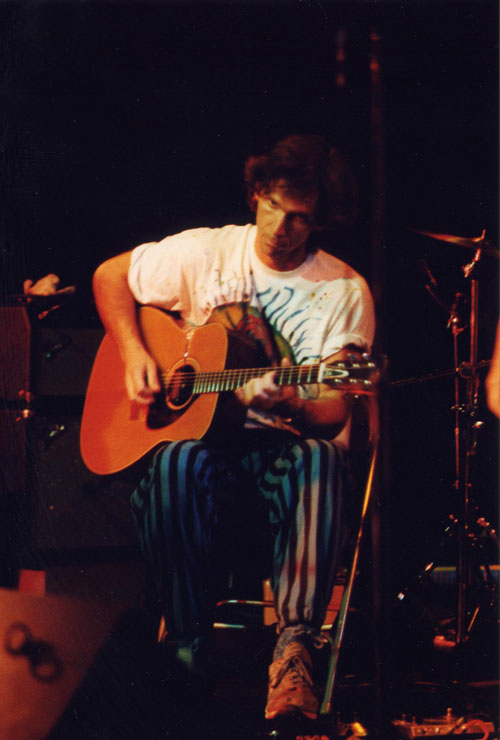 A music ‘zine is no place for political philosophy, but in the case of Mike Johnson, I feel it is central to understanding the man and his music. In his lyrics, Johnson has, if only out of allegiance to himself, expressed very deep anger and frustration about the state of the world. He does not consider Thinking Plague a “political band,” nor does he feel it constructive to just bitch and rant about things. The frustration he feels is personal. He loves the outdoors and feels more spiritually connected with the mountains and hiking trails than with the church. He has seen the ecosystem begin to crumble before his eyes, and this disgusts him. He has strong feelings about the human situation and writing is how he reacts to them.
A music ‘zine is no place for political philosophy, but in the case of Mike Johnson, I feel it is central to understanding the man and his music. In his lyrics, Johnson has, if only out of allegiance to himself, expressed very deep anger and frustration about the state of the world. He does not consider Thinking Plague a “political band,” nor does he feel it constructive to just bitch and rant about things. The frustration he feels is personal. He loves the outdoors and feels more spiritually connected with the mountains and hiking trails than with the church. He has seen the ecosystem begin to crumble before his eyes, and this disgusts him. He has strong feelings about the human situation and writing is how he reacts to them.
Johnson’s songs on In Extremis often mirror these feelings. The stunning four-minute opener, “Dead Silence,” begins with Deborah Perry intoning, “I lost my power of speech today.” Johnson explains, “Dead Silence is a personal expression of my own disgust and sometimes anguish about our ‘system,’ which is to say, post-Reagan laissez-faire capitalism, consumption, and environmental destruction.” The protagonist’s response is one of “speechlessness, aghastness, maximum appalledness” even as he/she asks in disbelief, “I hear no furor / Are none appalled?” to the oblivious masses. It is an angry song, but the anger is turned inward into an impotent state of helplessness. It is, as Johnson says, a “crisis of survival” for the protagonist, and no one else seems to care about this sorry state.
“Maelstrom” and “Kingdom Come” offer copious amounts of doomy apocalyptic visions, the result of the above mentioned “system” causing the inevitable destruction of our environment and our way of life. Both songs are more descriptive and less personal than “Dead Silence,” and rely on stormy, moody music to carry the brunt of the message. “Kingdom Come” lasts over 13 minutes and is instrumental for most of that time, while “Maelstrom” is barely four minutes and reaches a climax with such heavy bass that it reminded me of the mighty Anekdoten. This goes to show that Mike Johnson needs not rely solely on lyrics to convey his message – often the tumultuous music tells more of the story than the words.
Johnson’s songs also sometimes take an existential turn, as is the case with “Behold the Man” (lyrics cowritten with David Kerman). Its dialectical tone uncovers a tug of war between the young person you once were and the older person you’ve become. It is a song, says Johnson, “about getting older, more cynical and losing your focus or purpose. It’s about finding yourself roleless because you can’t believe in what you once did. One sees oneself becoming that which you disdained or dreaded when you were younger. How does one find a new way?” At the end of the song, Johnson finds an answer of sorts to the question why we continue in our “tattered roles:” “It must be they still suit us / There’s room just enough to grow.” On this positive note, the song ends. You need not hope you die before you get old, for we can always adapt and grow.
Evolution of the Plague
Thinking Plague has been alive in some form or another since the early 80s, beginning with guitarist / composer Mike Johnson and bassist / drummer / engineer Bob Drake experimenting in a small, homemade studio in Denver, Colorado. Drake had already earned a reputation as an engineer and mixer with a good ear and a capability to make great sounding tapes with minimal equipment. He had been given free reign over a small studio that, at the time, was a popular choice for local underground bands.
Here, he learned that bands did not necessarily have to be signed to a Big Label to make a record; they would just send the tapes to a small record pressing plant in Ohio, and suddenly, they had a record out! Drake was intrigued by this, and began experimenting with his own recordings. Since he was alone in the studio much of the time, and the studio didn’t pay him much anyway, they tolerated Drake’s indulgences.
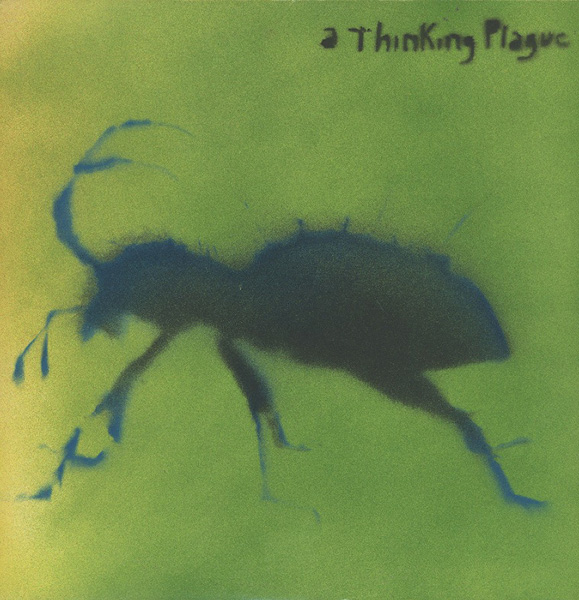 Johnson and Drake (on guitar / keyboards and bass / drums / keyboards respectively) recorded Thinking Plague’s first album, called ...A Thinking Plague, in 1982, on their own Endemic label. They were joined by Sharon Bradford (vocals), Harry Fleishman (organ), and others. The album was originally issued on vinyl, then reissued on cassette only, on a friend’s Prolific label. While the album didn’t sell well, it at least opened a few eyes with quirky, complex instrumental tracks with odd soprano melody lines sung by Sharon Bradford. “I Do Not Live,” the first song Johnson and Drake recorded, has an insistent rhythm and a jagged sound that on first listening might remind one of some of the new wave music of the time (Bill Nelson’s Red Noise comes to mind), but on closer listening is much more compositionally complex.
Johnson and Drake (on guitar / keyboards and bass / drums / keyboards respectively) recorded Thinking Plague’s first album, called ...A Thinking Plague, in 1982, on their own Endemic label. They were joined by Sharon Bradford (vocals), Harry Fleishman (organ), and others. The album was originally issued on vinyl, then reissued on cassette only, on a friend’s Prolific label. While the album didn’t sell well, it at least opened a few eyes with quirky, complex instrumental tracks with odd soprano melody lines sung by Sharon Bradford. “I Do Not Live,” the first song Johnson and Drake recorded, has an insistent rhythm and a jagged sound that on first listening might remind one of some of the new wave music of the time (Bill Nelson’s Red Noise comes to mind), but on closer listening is much more compositionally complex.
With Johnson’s quick bursts of acoustic and electric guitars, odd synth sounds (some of which were made with a simple Casio machine run through effects), and frequent shifts in tempo and instrumentation, this was decidedly more arty and musical than the usual fare. Other tracks are even more experiemental. “A Light Is On and Name the World” and “Four Men in the Rain” both are Drake solo pieces, with odd instruments accompanying found sounds and effects. Sharon Bradford contributed “The Taste That Lingers On,” featuring a very quirky vocal melody and fittingly absurd lyrics. “How to Clean Squid” is along the same lines, with Bradford singing / reciting actual directions on the culinary preparation of our seabound tentacled friends.
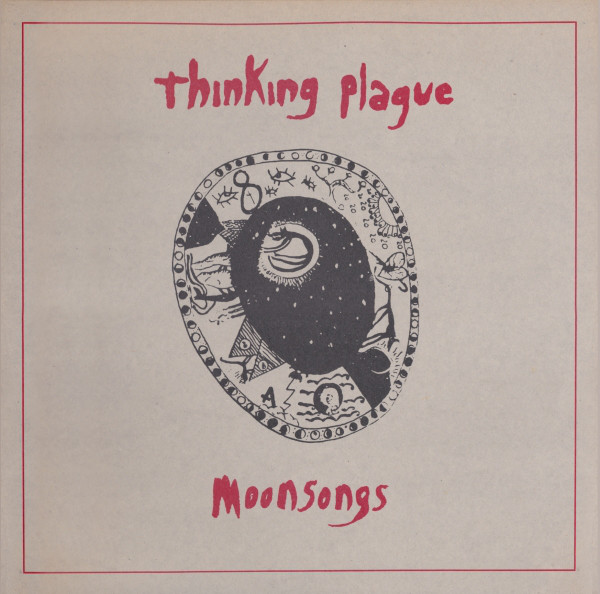 Johnson assembled a new lineup for their next outing, called Moonsongs, released on vinyl in 1987 (on the small European label Dead Man’s Curve). The key addition here was new vocalist Suzanne Lewis, whose dark, mysterious delivery and phrasing was a natural match for Johnson’s music. Mark Fuller, who played drums as a guest on the debut album, now became the band’s full time drummer. Eric Moon played keyboards, and his style lent a fuller, more spacious sound to the music. Johnson’s compositions were more cohesive and developed, and in the case of “Warheads,” achieved a certain majesty. This piece was inspired in part by Peter Gabriel’s fourth album (aka Security), and its use of the Linn drum machine, and the result is very powerful.
Johnson assembled a new lineup for their next outing, called Moonsongs, released on vinyl in 1987 (on the small European label Dead Man’s Curve). The key addition here was new vocalist Suzanne Lewis, whose dark, mysterious delivery and phrasing was a natural match for Johnson’s music. Mark Fuller, who played drums as a guest on the debut album, now became the band’s full time drummer. Eric Moon played keyboards, and his style lent a fuller, more spacious sound to the music. Johnson’s compositions were more cohesive and developed, and in the case of “Warheads,” achieved a certain majesty. This piece was inspired in part by Peter Gabriel’s fourth album (aka Security), and its use of the Linn drum machine, and the result is very powerful.
The title track, “Moonsongs,” is along the same lines, going through several lengthy sections, some of them edgy, some of them atmospheric. I could hear the Linn drums used to good effect in this piece as well. “Inside Out” is all atmosphere, with Suzanne Lewis’s faint vocals almost resembling Gilli Smyth’s famous “space whisper.” “Etude for Combo” is the only track in the Thinking Plague catalog that was recorded entirely live. After extensive rehearsal , the band invited a small audience of friends, and recorded this playful instrumental, warts and all. The recording is a bit rough around the edges, but it offers us a rare chance to hear Thinking Plague on the spot, as it happened (though it is by no means an improvised piece – in fact virtually none of Johnson’s songs contain improvisation), and to hear what exciting performers they can be.
Thinking Plague’s first two albums, long out of print, are finally being reissued by Cuneiform in Spring 1999, with both albums on one CD. Surely the timing could not be better.
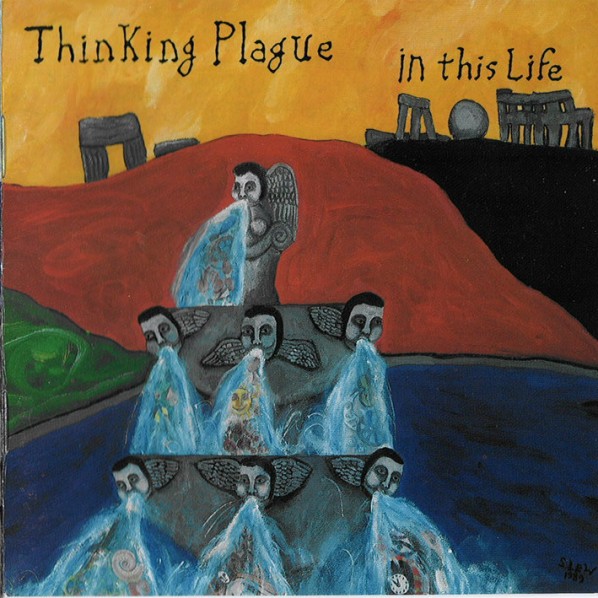 Their next album, In This Life (1989), has an interesting history. Mike Johnson had the pleasure of meeting Chris Cutler during Cutler’s tenure with Pere Ubu, and he handed Cutler a tape of the finished album. Cutler was impressed by what he heard, and asked Johnson what he intended to do with it. Johnson replied, “We want to put it out on your label!” and Cutler did. The album was released, to great critical acclaim, in 1989, on Cutler’s Recommended Records. This association with Cutler probably helped further pigeonhole the band as a “RIO” group, a tag that frustrates the band to this day.
Their next album, In This Life (1989), has an interesting history. Mike Johnson had the pleasure of meeting Chris Cutler during Cutler’s tenure with Pere Ubu, and he handed Cutler a tape of the finished album. Cutler was impressed by what he heard, and asked Johnson what he intended to do with it. Johnson replied, “We want to put it out on your label!” and Cutler did. The album was released, to great critical acclaim, in 1989, on Cutler’s Recommended Records. This association with Cutler probably helped further pigeonhole the band as a “RIO” group, a tag that frustrates the band to this day.
For In This Life, two new key members entered the fold: woodwind virtuoso Mark Harris and keyboardist Shane Hotle. The youthful Maria Moran played bass, and Lawrence Haugseth joined on clarinet and keyboards. Fred Frith guested on “Organism;” the band reportedly solicited Frith’s services just prior to driving him to the airport. Frith, with no preparation and having never heard the piece, nevertheless turned in a convincing performance. This album really broke the band into the “mainstream” of underground progressive rock, and was received very well. “Lycanthrope” opens the album with Johnson’s brisk guitar strums and Suzanne Lewis’s dark vocals. Other standouts include “Love” and my personal favorite, “The Guardian.” The CD edition features two bonus tracks from the first two albums (“Moonsongs” and “Possessed”).
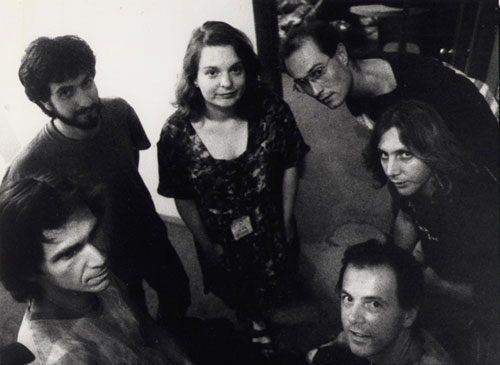 Thinking Plague has never enjoyed a stable cast of musicians, and the band slowly began to fall apart not long after the release of In This Life. Suzanne Lewis moved to New York to pursue a more “urban” lifestyle and to develop her own considerable compositional talents. She and Drake released some albums as Hail (including the album Kirk, available from Wayside), with Lewis writing and playing guitar on the songs, and Drake handling most of the other instruments and production.
Thinking Plague has never enjoyed a stable cast of musicians, and the band slowly began to fall apart not long after the release of In This Life. Suzanne Lewis moved to New York to pursue a more “urban” lifestyle and to develop her own considerable compositional talents. She and Drake released some albums as Hail (including the album Kirk, available from Wayside), with Lewis writing and playing guitar on the songs, and Drake handling most of the other instruments and production.
Bob Drake left to devote his time to being a producer and engineer in an LA studio, earning credits on several high profile pop and even rap albums (Ice Cube, in case you’re interested). Johnson continued to send him demos of song ideas. One such song written around this time was “Kingdom Come.” According to Johnson, Drake did not much care for this song, and thus did not participate in its completion. It eventually appeared on 1998’s In Extremis album, with completely rewritten lyrics. Chris Cutler had offered some lyrics of his own for Johnson to use (Cutler didn’t care for the original lyrics either), but Johnson eventually arrived at a new set of lyrics himself, and all involved were happy with the result.
Other positive developments were taking place. Bob Drake had hooked up with drummer / composer David Kerman in 1989 while in LA, and by 1990, Kerman had joined Thinking Plague. Johnson has since toured Europe with Kerman’s band, 5uu’s, and the two have worked well together ever since. Mark Harris and Shane Hotle remained, as reed player and keyboardist respectively, from the In This Life lineup. The exodus of Drake and Lewis was a big setback, however, and it would be a number of years before the world heard any new Thinking Plague product.
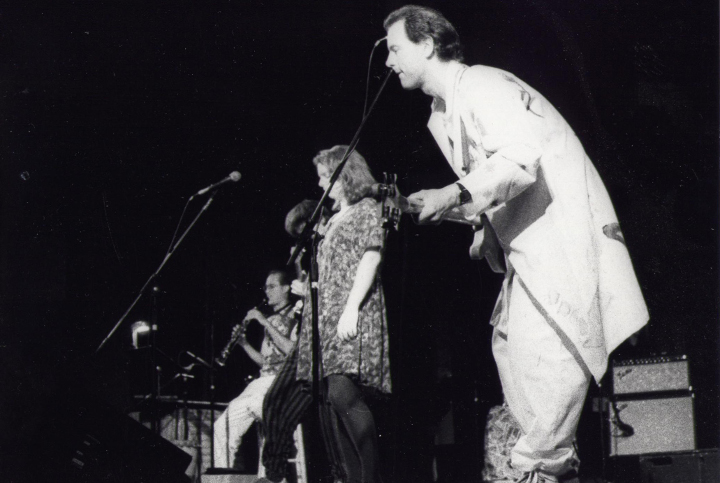 In the meantime, Johnson began working on a rewrite of two older compositions, “Etude for Combo” (from Moonsongs) and “Organism” (from In This Life, but also released in another version on a Recommended Records sampler LP). The two were combined and greatly enhanced into “Les Etudes d’Organism,” conceived as a live set piece by Johnson, Kerman, Drake, Hotle, and Harris, based on themes written by Johnson. The resulting piece is astounding. Beginning with a thunderous intro lifted straight from “Organism,” it soon gives way to a few random sax blasts and voices, then reprises themes from “Etude for Combo,” presenting a number of variations on this theme, including a “stupid ska section,” as the band affectionately refers to it. The band’s dexterity and ability to shift instantly into different tempos and volumes is especially apparent here. The last section of the piece is consists mostly of a dark throbbing pulse over which Bob Drake (playing guitar; a harbinger of things to come in his 90s solo career) builds an wailing, emotional solo. Several earlier themes are revisited and the piece ends with a quiet keyboard fade-out. This is a remarkable fourteen minutes of music, and there’s something to enjoy for every progressive rock listener.
In the meantime, Johnson began working on a rewrite of two older compositions, “Etude for Combo” (from Moonsongs) and “Organism” (from In This Life, but also released in another version on a Recommended Records sampler LP). The two were combined and greatly enhanced into “Les Etudes d’Organism,” conceived as a live set piece by Johnson, Kerman, Drake, Hotle, and Harris, based on themes written by Johnson. The resulting piece is astounding. Beginning with a thunderous intro lifted straight from “Organism,” it soon gives way to a few random sax blasts and voices, then reprises themes from “Etude for Combo,” presenting a number of variations on this theme, including a “stupid ska section,” as the band affectionately refers to it. The band’s dexterity and ability to shift instantly into different tempos and volumes is especially apparent here. The last section of the piece is consists mostly of a dark throbbing pulse over which Bob Drake (playing guitar; a harbinger of things to come in his 90s solo career) builds an wailing, emotional solo. Several earlier themes are revisited and the piece ends with a quiet keyboard fade-out. This is a remarkable fourteen minutes of music, and there’s something to enjoy for every progressive rock listener.
Also to eventually appear on the 1998 album was “This Weird Wind,” cowritten by Johnson and Drake and recorded in 1992. Drake provided vocals and lyrics and Johnson handled the music (Drake is also the singer and bassist for 5uu’s). While Johnson originally envisioned this song as a folky “Yessy” song (Drake’s Jon Anderson-like vocal style inevitably inviting comparisons), the final version impressively transcends both folk and Yes, not to mention “RIO.”
Very slowly, “Kingdom Come,” “Les Etudes,” and “This Weird Wind” came together and were recorded. Drake then left for studio work in France, and apart from his mixing work on the completed version of In Extremis, his musical input to Thinking Plague ended there. While these earlier recordings date back to the early 90s, they made it to the 1998 album pretty much intact, save for Drake’s rather radical post-production work. Johnson reports that he was a bit surprised when the tapes came back from Drake, as they had a really big drum sound with lots of compression – surely a product of Drake’s extensive experience producing more mainstream rock. It works to the music’s advantage, however; Johnson holds high praise for Drake’s musical sense and acute ear, let alone his skill with mixing and engineering. Drake’s past and present performances of Thinking Plague material were done entirely by ear (he does not read music, and he confesses on his web site that he is the kind of person who refuses to read directions!).
 Two more key members entered the picture in 1997. Dave Willey, a multi-instrumentalist, leads his own band Hamster Theatre (who have a studio album Songs from the Hamster Theater performed entirely by Willey, a new live album with Mike Johnson playing guitar, and another studio album on the way) joined the group playing bass, accordion, and other instruments. Willey’s impressive background as a composer, schooled musician and instrumentalist (in contrast to Drake’s more instinctive approach) promised that the new Thinking Plague would be a musical powerhouse indeed. See the review of Hamster Theatre’s new live album in the “Reviewers’ Roundtable” section of this issue.
Two more key members entered the picture in 1997. Dave Willey, a multi-instrumentalist, leads his own band Hamster Theatre (who have a studio album Songs from the Hamster Theater performed entirely by Willey, a new live album with Mike Johnson playing guitar, and another studio album on the way) joined the group playing bass, accordion, and other instruments. Willey’s impressive background as a composer, schooled musician and instrumentalist (in contrast to Drake’s more instinctive approach) promised that the new Thinking Plague would be a musical powerhouse indeed. See the review of Hamster Theatre’s new live album in the “Reviewers’ Roundtable” section of this issue.
Deborah Perry, who was the original vocalist / keyboardist for Hamster Theater, joined Thinking Plague around the same time as lead vocalist. While stylistically very different from Suzanne Lewis, Perry’s delivery suits Johnson’s material equally well. She is well schooled musically, and takes her new position very seriously, striving to master Johnson’s difficult material while breathing life into the lyrics, adapting the melodies and lyrics to better suit her phrasing and vocal range, and other formidable tasks.
 She studies Johnson’s sheet music meticulously when tackling a new composition: “I sat down with the sheet music to re-mark note values for my own comprehension and to do some lyric edits for the words to make sense in the context of the melodic and rhythmic structures. Then I just began working through the songs with the tape and transcription. This was tough material, but I really wanted to learn it. It was an exciting process."
She studies Johnson’s sheet music meticulously when tackling a new composition: “I sat down with the sheet music to re-mark note values for my own comprehension and to do some lyric edits for the words to make sense in the context of the melodic and rhythmic structures. Then I just began working through the songs with the tape and transcription. This was tough material, but I really wanted to learn it. It was an exciting process."
Four new compositions round out the In Extremis album: “Dead Silence,” “Behold the Man,” “Maelstrom,” and “The Aesthete.” Unlike “Wind,” “Etudes,” and “Kingdom,” these were written with Perry in mind, Johnson notes. They are quite vocal-oriented, and often almost catchy. Compositionally, they are altogether tighter songs, with a lot more activity happening in a smaller space of time (they are all in the four minute range). Clearly, Johnson’s writing has progressed greatly since In This Life, with more direct, concise compositions with a greater sense of urgency.
The future looks bright for Thinking Plague; if not in monetary terms, then at least in artistic terms. Mike Johnson is expanding his arsenal of digital technology, which will greatly aid him in more spontaneous, efficient composition. Though he is an accomplished composer, he admits that he can be very slow putting a piece together (“I take hours and hours to write 20 seconds of music”). At the moment, he already has several new compositions waiting on deck for the next offering (some of which we may hear at Prog Day 1999, according to Johnson). He also has, for the moment, a strong cast of musicians that seem ready to go wherever Johnson leads them. Perry, Willey, Kerman, Harris, and Hotle are all extremely skilled players who made significant contributions to In Extremis. We wish them well, and look forward to future recordings and live performances (please, don’t make us wait another nine years!).
Filed under: Profiles, Issue 17
Related artist(s): 5uu's, Dave Kerman, Dave Willey, Thinking Plague, Bob Drake, Mike Johnson
What's new
These are the most recent changes made to artists, releases, and articles.
- Review: Sterbus - Black and Gold
Published 2026-03-03 - Release: Janel Leppin's Ensemble Volcanic Ash - Pluto in Aquarius
Updated 2026-03-02 15:06:51 - Release: Janel Leppin - Slowly Melting
Updated 2026-03-02 15:05:27 - Release: Alister Spence - Always Ever
Updated 2026-03-02 15:04:11 - Release: Let Spin - I Am Alien
Updated 2026-03-02 15:02:41 - Review: Falter Bramnk - Vinyland Odyssee
Published 2026-03-02 - Review: Exit - Dove Va la Tua Strada?
Published 2026-03-01 - Review: Steve Tibbetts - Close
Published 2026-02-28 - Release: We Stood Like Kings - Pinocchio
Updated 2026-02-27 19:24:02 - Release: Stephen Grew - Pianoply
Updated 2026-02-27 19:20:11 - Release: Thierry Zaboitzeff - Artefacts
Updated 2026-02-27 00:16:46 - Review: Kevin Kastning - Codex I & Codex II
Published 2026-02-27 - Release: Zan Zone - The Rock Is Still Rollin'
Updated 2026-02-26 23:26:09 - Release: The Leemoo Gang - A Family Business
Updated 2026-02-26 23:07:29 - Release: Ciolkowska - Bomba Nastoyashchego
Updated 2026-02-26 13:08:55 - Review: Immensity Crumb - Chamber Music for Sleeping Giants
Published 2026-02-26 - Release: The Gatekeepers - Diary of a Teenage Prophet
Updated 2026-02-25 15:55:58 - Review: Mars Lasar - Grand Canyon
Published 2026-02-25 - Listen and discover: Mordecai Smyth will not break your back
Published 2026-02-25
